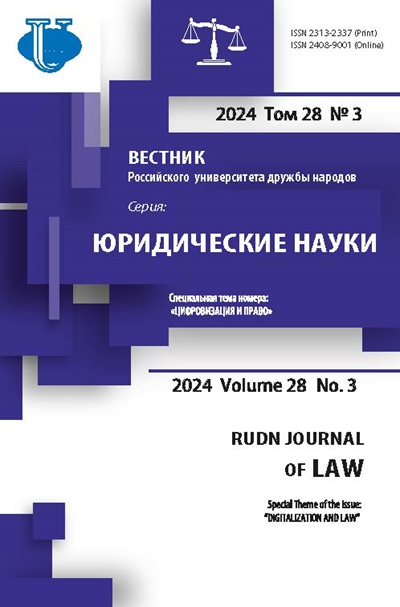Доктрина тщетности (a doctrine of frustration) и доктрина форс-мажора (a doctrine of force majeure) в индийской правоприменительной практике в цифровую эпоху
- Авторы: Бегичев А.В.1, Цандер Я.М.1
-
Учреждения:
- Российский университет дружбы народов
- Выпуск: Том 28, № 3 (2024): ЦИФРОВИЗАЦИЯ И ПРАВО
- Страницы: 604-621
- Раздел: ГРАЖДАНСКОЕ ПРАВО
- URL: https://journals.rudn.ru/law/article/view/40938
- DOI: https://doi.org/10.22363/2313-2337-2024-28-3-604-621
- EDN: https://elibrary.ru/JAPSAB
- ID: 40938
Цитировать
Аннотация
Проведен сравнительно-правовой анализ наиболее актуальных доктрин форс-мажора («force majeure») и тщетности договора («frustration») в индийском законодательстве. Цель: исследовать правовую природу указанных концепций, выделить общие черты и различия, а также признаки обстоятельств, влекущих невозможность исполнения договора и являющихся форс-мажорными, посредством анализа индийского законодательства и судебной практики исследовать сферу применения данных концепций в условиях цифровизации и увеличения электронного документооборота. Методы : теоретические методы формальной и диалектической логики, сравнительно-правовой, интерпретации, описания; применялись также частно-научные методы: юридико-догматический и метод толкования правовых норм. Результаты : доктрина «форс-мажора» в индийской практике применяется в случае определенного «форс-мажорного события», предусмотренного в контракте, тогда как «невозможность» охватывает другие непредвиденные обстоятельства, которые не подпадают под действие положения о форс-мажорных обстоятельствах. При этом в индийской практике «невозможность» означает «неосуществимость», а не просто буквальную физическую «невозможность». Выводы: основным отличием концепции фрустрации от форс-мажора в индийской практике является влияние события на договор, при этом, несмотря на имеющиеся различия, данные правовые институты имеют общую цель, которая состоит в уменьшении возможных убытков участников договора в случае возникновения непредвиденных обстоятельств.
Об авторах
Александр Валерьевич Бегичев
Российский университет дружбы народов
Автор, ответственный за переписку.
Email: begichev100@mail.ru
ORCID iD: 0009-0003-4329-9938
доктор юридических наук, профессор кафедры гражданского права и процесса и международного частного права, юридический институт
117198, Российская Федерация, г. Москва, ул. Миклухо-Маклая, д. 6Яна Меркурьевна Цандер
Российский университет дружбы народов
Email: janastr@mail.ru
ORCID iD: 0000-0001-8898-1234
аспирант кафедры гражданского права и процесса и международного частного права, юридический институт
117198, Российская Федерация, г. Москва, ул. Миклухо-Маклая, д. 6Список литературы
- Архипов Д.А. Модификация обязательств при наступлении форс-мажора: теория и практика // Судья. 2020. № 7(115). С. 59-64.
- Beatson, J., Burrows, A. & Cartwright, J. (2010) Anson’s Law of Contract. Oxford, Oxford University Press.
- Бегичев А.В. Роль цифровизации во взаимодействии судебных и нотариальных органов в применении примирительных процедур // RUDN Journal of Law. 2022. Т. 26. № 2. С. 485-500. https://doi.org/10.22363/2313-2337-2022-26-2-485-500
- Begichev, A.V. (2022b) Remote Digital Technologies for Notary Protection of the Rights of Economic Activities Participants. In: Inshakova, A.O. & Frolova, E.E. (eds.). Smart Technologies for the Digitisation of Industry: Entrepreneurial Environment. Smart Innovation, Systems and Technologies, vol 254. Springer, Singapore. pp. 165-178. https://doi.org/10.1007/978-981-16-4621-8_14
- Белов В.А. Индийский Закон о договорах 1872 года (общие сведения, общий комментарий, оригинальный текст и русский перевод) // Правоведение. 2014. № 6(317). С. 143-205.
- Bezbakh, V.V. & Frolova, E.E. (2022) Augmented Reality and Civil Law Regulation of Business Relations. Smart Innovation, Systems and Technologies. (254), 29-37. https://doi.org/10.1007/978-981-16-4621-8_3
- Эннекцерус Л., Кипп Т., Вольф М. Курс германского гражданского права; пер. с 13-го нем. изд. К.А. Граве и др.; под ред. Д.М. Генкина и И.Б. Новицкого. М.: изд-во иностранной лит., 1950. 483 с.
- Фонотова О.Н., Индинок П.Д. Исполнение международных коммерческих контрактов в условиях пандемии COVID-19: зарубежное и российское правовое регулирование // Законодательство. 2022. № 5. С. 63-70.
- Гимадрисламова О.Р., Тимофеева К.С. Соотношение российских институтов форс-мажора и прекращения обязательства с английской доктриной frustration // Евразийский юридический журнал. 2021. № 1(152). С. 187-190. https://doi.org/10.46320/2073-4506-2021-1-152-187-190
- Канашевский В.А. Внешнеэкономические сделки: материально-правовое и коллизионное регулирование. М.: Волтерс Клувер, 2008. 608 с.
- Коршунова Н. П. Непреодолимая сила: новый взгляд на старую проблему // Журнал российского права. 2008. № 3 (135). С. 78-93.
- Крашенинникова Н.А. Индусское право: история и современность. Предисл. О. Жидкова. М.: изд-во МГУ. 1982. 192 с.
- Лукашук И.И. Вопросы ответственности в праве договоров // Международное публичное и частное право. 2007. № 1. С 2-4.
- Римское частное право: учебник / коллектив авторов; под ред. И.Б. Новицкого, И.С. Перетерского. М.: КНОРУС, 2014. 608 с.
- Пирвиц Э.Э. Значение вины, случая и непреодолимой силы в гражданском праве. Часть вторая // Вестник гражданского права. 2010. № 6. С. 146-206.
- Протопопова О.В., Ботвинник С.Л. Доктрина frustration of contract в английском праве // Проблемы экономики и юридической практики. 2020. № 6. C. 159-164.
- Rao, T.S.R. (1958) Conflict of laws in India. Zeitschrift Für Ausländisches Und Internationales Privatrecht. 23(2), 259-279. Available at: http://www.jstor.org/stable/27873899
- Rusakova, E.P. & Frolova, E.E. (2022) Current Problems of Digital Justice in the BRICS Countries. Smart Innovation, Systems and Technologies. (254), 143-153. https://doi.org/10.1007/978-981-16-4621-8_12
- Терди Е. С. Английская модель невозможности исполнения обязательства: история становления и особенности рецепции (на примере Индии) // Российское правосудие. 2018. № 6. (146) С. 22-46.
- Тололаева Н.В., Церковников М.А. Научно-практический комментарий к Постановлению Пленума Верховного Суда РФ от 24 марта 2016 г. № 7 «О применении судами некоторых положений Гражданского кодекса Российской Федерации об ответственности за нарушение обязательств» (начало) // Вестник гражданского права. 2023. № 5. С.153 -199. https://doi.org/10.24031/1992-2043-2023-23-5-153-199
- Тололаева Н.В., Церковников М.А. Научно-практический комментарий к Постановлению Пленума Верховного Суда РФ от 24 марта 2016 г. N 7 «О применении судами некоторых положений Гражданского кодекса Российской Федерации об ответственности за нарушение обязательств» (окончание) // Вестник гражданского права. 2023. Т. 23. № 6. С. 133-197. https://doi.org/10.24031/1992-2043-2023-23-6-133-197
Дополнительные файлы















